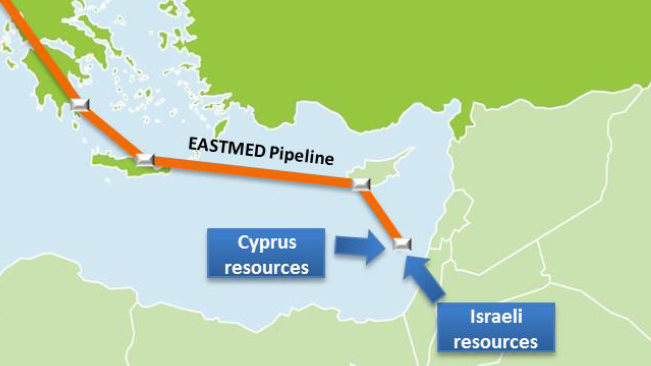EC Backs 'Ending Cyprus Isolation'
“We want to make sure that Cyprus is much better connected, not only with its neighbours in the eastern Mediterranean, but also with the European Union,” Maros Sefcovic, the EU commissioner for Energy Union, told an event in Brussels last week at which he and Cyprus’s energy minister Yiorgios Lakkotrypis were panellists.
The latest EU list of Projects of Common Interests includes the ‘Euroasia Interconnector’ that would connect Israel, Cyprus, Crete and mainland Greece by a 1,518-km mostly subsea cable (400 kv, 2000 MW); and the 1,700-km East Med gas pipeline that would do broadly the same.
“We are awaiting the result of the feasibility study,” said Sefcovic about the East Med gas pipe project. The EU Commission’s website indicates that front-end engineering work for East Med will not be completed before December 2017. Its promoter is IGI Poseidon, a 50-50 joint venture of Greek state gas supplier Depa and EDF-owned Italian supplier Edison. The EU has provided 50% (or €2mn) of the total €4mn cost of studies. A recent EU list of Projects of Common Interest gives its estimated capacity as 15.3bn m3/yr (450 GWh/d): 1bn m3/yr for Cyprus and 14.3bn m3/yr to Greece.
The Cypriot energy ministry’s role – under the East Med pipe project – is to assess options to monetise East Med gas resources, including offshore Israel and Egypt, with the aim of ending Cyprus’s isolation; the island currently lacks any natural gas supply. Energy minister Lakkotrypis told the Brussels event that Cyprus is now looking at monetising its offshore gas partly on the island, but with most piped to Egypt for the domestic market there but with some exported as LNG from currently idled liquefaction plants.

East Med route (Map credit: Depa)
Sefcovic expressed confidence that new sources of gas will reach the Balkans too, via Greece, ending the region’s current dependence on one supplier [Russia] such that “each country should have access to at least three sources of gas.”
He noted the ground-breaking ceremony in mid-May at Thessaloniki for the 10bn m3/yr TAP section of the Southern Gas Corridor, for Azeri gas imports, and the “very strong progress with IGB” – the between 3bn and 5bn m3/yr proposed Interconnector Greece-Bulgaria, adding that “by summer 2016, we hope for a positive result for IGB.”
Good energy cooperation in the East Mediterranean could serve political bridge-building in the area, said Sefcovic, who in 1999-2000 was Slovakia’s ambassador to Israel and has visited Cyprus often.
Sefcovic was “encouraged” by recent remarks by negotiators on both sides of the Cyprus reunification talks to the effect that 2016 would be the year when peaceful settlement will be found. This would be a highly “positive signal for the whole of Europe and the Eastern Mediterranean” to which he expected the international business community would respond favourably.
Potential pitfalls though remain. Last week too, the president of Cyprus Nicos Anastasiades declined to attend a meeting at a UN summit in Turkey hosted by his Turkish counterpart Recep Tayyip Erdogan after learning that the Turkish Cypriot leader Mustafa Akinci was also invited. Also the far-right ELAM party, which opposes reunification, picked up its first seats in the Cypriot parliament in May 22 elections.
Natural Gas Europe hosted the Brussels event on May 25 at which Sefcovic and Lakkotrypis spoke.
Mark Smedley


